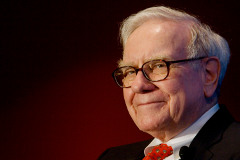 There are few keener advocates of index funds than the world’s most famous investor, Warren Buffett. Over many years, Buffett has consistently stated that indexing is the logical solution for the vast majority of investors. He did it again at the Berkshire Hathaway shareholders’ meeting a couple of weekends ago. Only this time he spoke on the subject at greater length and in even more emphatic language than he has in the past. Buffett spent twelve-and-a-half minutes delivering what he jokingly referred to as a “sermon”. In it he spelled out his opinions on the merits of index funds compared to actively managed funds. You can watch the relevant section in full — it begins at around 2.42.20 — but here is a summary of what he said. (As you read this, understand that Buffett is referring to stockbrokers, highly paid fund managers, and investment and asset consultants.) He’s winning his bet Buffett famously placed a bet that, over a decade and net of fees, a Vanguard S&P 500 index fund would outperform the cumulative returns of five funds picked by the New York hedge fund company Protégé Partners. Now, these are smart people using sophisticated investment strategies. Buffett presented a chart which showed that, since 2008, the index fund has returned 65.7%, while the hedge funds have returned 21.9%. People just don’t get it Buffett then lamented the fact that, even when presented with the evidence that paying for active fund management is a bad idea, investors still don’t want to believe it. Over to the Oracle of Omaha: “It seems so elementary, but I will guarantee you that no endowment fund, no public pension fund, no extremely rich person (wants to believe that index funds are best).' “They just can’t believe that because they have billions of dollars to invest that they can’t go out and hire somebody who will do better than average. I hear from them all the time.” Investment consultants are part of the problem “Supposedly sophisticated people, generally richer people, hire consultants, and no consultant in the world is going to tell you, ‘just buy an S&P index fund and sit for the next 50 years.’ You don’t get to be a consultant that way. And you certainly don’t get an annual fee that way." “So the consultant has every motivation in the world to tell you, ‘this year I think we should concentrate more on international stocks,’ or ‘this manager is particularly good on the short side’, and so they come in and they talk for hours, and you pay them a large fee, and they always suggest something other than just sitting on your rear end and participating in the American business without cost. And then those consultants, after they get their fees, they in turn recommend to you other people who charge fees, which. cumulatively eat up capital like crazy." “I’ve talked to huge pension funds, and I’ve taken them through the math, and when I leave, they go out and hire a bunch of consultants and pay them a lot of money. It’s just unbelievable.” Predicting the winners is unpredictable “There’s been far, far, far more money made by people in Wall Street through salesmanship abilities than through investment abilities. There are a few people out there that are going to have an outstanding investment record. But very few of them. And the people you pay to help identify them don’t know how to identify them. They do know how to sell you.” Index funds are the answer “(A passive investor) absolutely gets the record of American industry. For the population as a whole, American business has done wonderfully. And the net result of hiring professional management is a huge minus.” “All the commercial push is behind telling you that you ought to think about doing something today that’s different than you did yesterday. You don’t have to do that. You just have to sit back and let American industry do its job for you.” There are some very powerful vested interests who don’t like what Buffett has to say about indexing — notably fund managers, investment consultants, stockbrokers and investment platforms. It also annoys financial advisers who see fund selection as an integral part of their value proposition. It’s an awkward message too, for the investment media. After all, without active management, what have they got left to talk about? There are even those who argue that Buffett is a hypocrite and that he encourages people to index so there are more opportunities for him, as an active investor, to exploit. My view is that Buffett is simply being realistic. He can see that, for all the marketing hype, trying to identify an active manager who will outperform in the future is, to quote Berkshire Hathaway’s Vice Chairman Charlie Munger, “like looking for a needle in a haystack”. There is simply no robust process to identify the outperformers in advance. The irony of it all is that he's created his wealth from active investment management. From 1965 through to the end of last year, Buffett's Berkshire Hathaway shares have risen 1,598,284 percent, versus the S&P 500’s 11,355 percent (and less for most professionally managed funds). Maybe he understands how difficult out performing really is! Warren Buffett is, remember, the most successful investor of the modern era. When he offers such candid advice, no matter what your beliefs, it makes sense to pay attention. In a few words, Buffett’s advice was this: don't pay too much. And I agree wholeheartedly.
Nikki
13/5/2016 10:14:04 am
What I find confusing is that my adviser continually says trying to pick one fund over another brings better results because he can show that these funds have done better than average. You then have someone like Warren Buffett who says you cant. What do you do?
Reply
Tony
15/5/2016 07:38:25 am
Really good question Nikki. There's a distinction here. It's easy to provide a list of fund managers who have outperformed. It's whether they can reproduce that outperformance in the future that counts. Buffett says that there is no way to reliably pick those future winners in advance. As a result, he suggests you should focus instead on those things that you can control, one of those those being reducing costs. There is plenty of evidence to show that there is a correlation between lowr costs and better performance. My suggestion is that you determine what your returns after all fees have been and then compare that to what the index returns have been. You can get these index returns from this download:
Reply
marilyn
19/5/2016 03:03:30 pm
Hi Tony,
Reply
Tony
20/5/2016 08:14:03 am
Hi Marilyn,
Reply
John G
19/5/2016 08:04:13 pm
Thanks Tony. Go the index!
Reply
Tony
19/5/2016 08:04:54 pm
Im with you Jon, index funds are a hard act to follow. Still have to get your asset allocation right though.
Reply
Your comment will be posted after it is approved.
Leave a Reply. |















 RSS Feed
RSS Feed

10/5/2016
6 Comments